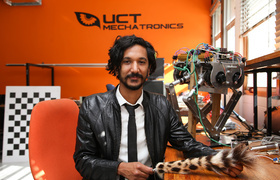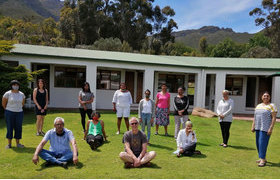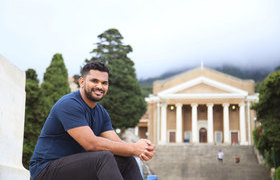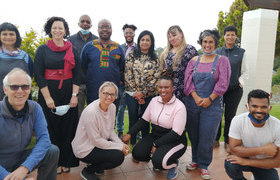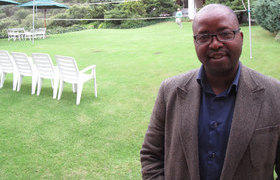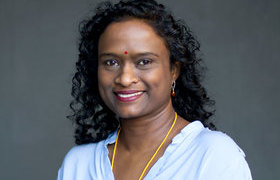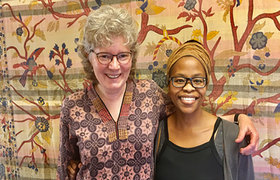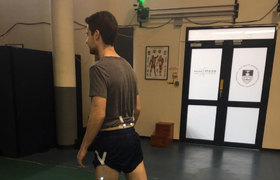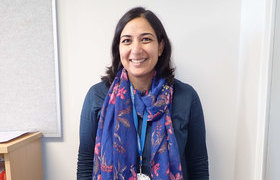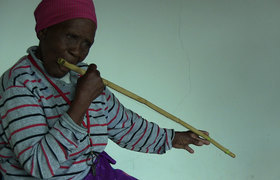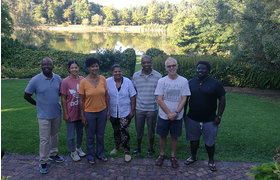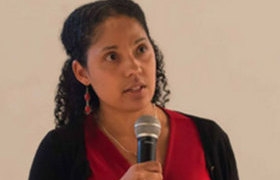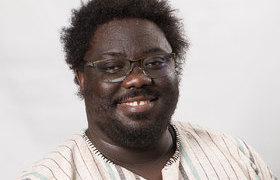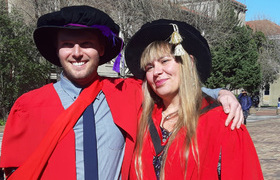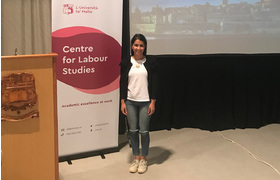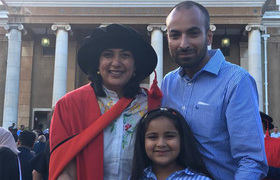UCT’s Prof Ed February bows out gracefully
10 November 2020 | Story Niémah Davids. Photo Supplied. Read time 7 min.
“There is no doubt in my mind that surviving the first three years as a lecturer at the University of Cape Town (UCT) was the hardest thing that I have ever done,” said Associate Professor Edmund February.
A professor in UCT’s Department of Biological Sciences in the Faculty of Science, and an international leader in the field of plant ecology, Associate Professor February’s two-decade journey with UCT will come to a close at the end of 2020.
But his academic life has been anything but plain sailing. When he kick-started his career at UCT, he had no experience as a lecturer, and didn’t quite understand the dynamics of an academic higher education institution. Simply put, he said, it was a case of sink or swim – and in this instance, he wasn’t a very strong swimmer.
“During those first three years, my lectures were truly awful.”
“I had no experience. I had no mentoring either. During those first three years, my lectures were truly awful. I have no doubt about that,” he said.
Rocky road
February arrived at UCT in August 2000 as an academic transformation candidate in the botany department. Back then, the Andrew W Mellon Foundation in New York had allocated funding to the faculty for a three-year probationary employment period to accelerate transformation in the area of plant ecology.
He had received his PhD in botany from UCT three years prior – all while working in the Department of Palaeontology at the Iziko South African Museum, where he had been employed for 11 years. It was there that he put his undergraduate and master’s degrees in history and archaeology (also obtained at UCT) to good use.
“At the time, there were very few people of colour with a PhD in botany.”
“At the time, there were very few people of colour with a PhD in botany. I applied for the position and I got the job, even though I didn’t have biological science as my undergrad degree,” he said.
With no teaching experience and not an ounce of guidance, February plunged in at the deep end. Within two weeks of arriving at UCT he was presented with a full lecture load, and was tasked with coordinating the honours class the following year.
“Because I had received my PhD from the department, I was expected to know how the department operated. I had no help, and I had to learn from scratch,” he said.
“In short, I had to teach myself a three-year undergraduate degree in biology, while teaching that same course. At age 45, I was going through my greatest learning experience ever – and it was certainly traumatic, with long, long hours at the office preparing lectures.”
A second chance
At the end of his three-year stint, the faculty heads of department recommended that February’s contract be terminated.
“That meeting was really hard and brutal. I left there thinking that I was done with UCT.”
“That meeting was really hard and brutal. I left there thinking that I was done with UCT,” he said.
But other senior academics got wind of the decision and stepped in, and February was granted an extra year of probation. Slowly but surely, he said, he developed a knack for the role. He credits Emeritus Professor William Bond and Associate Professor Tony Verboom, both in the Department of Biological Sciences, for their role in shaping his career.
“I learned a lot from William and Tony; they were colleagues who I could ask for help. I am forever grateful.”
When he first started at UCT, he spent hours in the field alongside Emeritus Professor Bond, “absorbing everything”, while Associate Professor Verboom provided tips and advice on how February should structure his classes.
“He (Tony) was a great support. He sat in on my classes and gave some great pointers. William always had my back and supported me in any way he could. I learned an enormous amount from William. Without him, I would not be where I am today,” February said.
A wave of change
UCT in 2020 is completely different from the UCT he joined in 2000, said February.
The university has experienced “massive transformation” in the past two decades. With that, he said, comes a diverse staff complement, which includes more women academics, and a student body that’s more representative of a new South Africa.
“We are still lecturing at the same high standard. And while tests and exams have evolved, the standard hasn’t changed.”
“The most dramatic change for me is in the demographic profile of the student and academic body. In [that] there’s been no compromise on academic quality. We are still lecturing at the same high standard. And while tests and exams have evolved, the standard hasn’t changed.”
In addition, he said, the support that the university offers to new academics today is “fantastic”. The Next Generation Professoriate (NGP) programme and the New Academic Practitioners’ Programme (NAPP) are two “valuable” initiatives that allow new academics to settle in and familiarise themselves with the new environment, and provide advice on what’s required when stepping into those big boots.
“Both programmes are hugely important and make an enormous contribution to an academic’s forthcoming career,” February said.
Saying farewell
In preparation for his retirement, February has spent the past 12 months winding down his research and his involvement in student affairs. But he continues to coordinate a first-year course, which has taken “quite a bit of time”. This is a far cry from his demanding teaching schedule, and from the National Research Foundation’s evaluation panel for ratings for the plant sciences, which he spent several years leading.
February said that he will miss interacting with students, and grabbing a cup of coffee and engaging in deep conversation with his colleagues.
“It has been a true privilege to work with the calibre of students that we have at UCT.”
“It has been a true privilege to work with the calibre of students that we have at UCT. We have some of the country’s brightest young minds at our university. I also remain in awe of the intellect and the range and diversity of knowledge of my colleagues. I will surely miss the students and my colleagues.”
Life after UCT is on the horizon. While he will miss making his way to campus every morning, he is looking forward to his next adventure – this includes replacing his existing 4X4 with a brand-new one and travelling across Southern Africa.
“My wife and I will both retire together, and we will take all our toys with us and explore the mountains and open spaces of Southern Africa. That’s the five-year plan, anyway,” he said.
 This work is licensed under a Creative Commons Attribution-NoDerivatives 4.0 International License.
This work is licensed under a Creative Commons Attribution-NoDerivatives 4.0 International License.
Please view the republishing articles page for more information.
Next Generation Professoriate (NGP)
The Next Generation Professoriate (NGP) is a mid-career academic staff development and support programme. Funded by the vice-chancellor’s Strategic Funds, the NGP addresses demographic inequalities in the academic hierarchy. The goal is to help members become associate and full professors.
The NGP was officially launched in September 2015. By the end of 2018, four of its members had been promoted to full professor and a further 14 had reached the rank of associate professor.
The programme is led by Dr Robert Morrell, who has over 35 years of academic experience in South African universities. He has a B1-rating from the the National Research Foundation (NRF) and is an elected member of the Academy of Sciences in South Africa.
Newsletters
In the news
